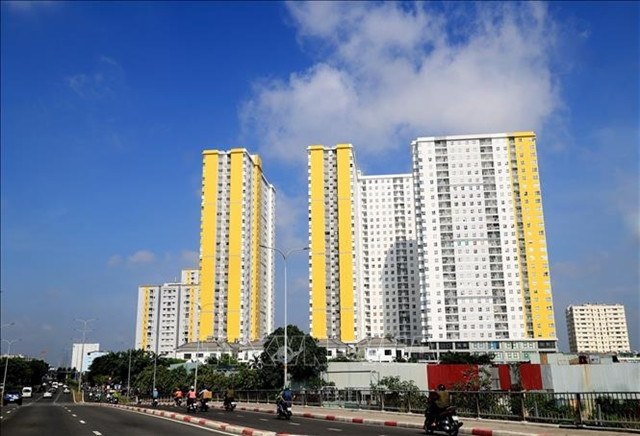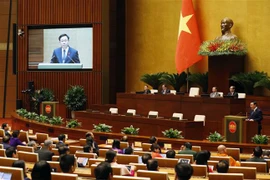 The amended Land Law is expected to promote transparent and sustainable development of the real estate market. (Photo: VNA)
The amended Land Law is expected to promote transparent and sustainable development of the real estate market. (Photo: VNA)Comprising 16 chapters and 260 articles, the law would solveexisting problems in land management and contribute to promoting growth withinnovations and breakthroughs in thinking, Deputy Prime Minister Tran Hong Hasaid, emphasising that improving the legal framework for land has been a focusof the Party and the Government.
As land and land management are a huge and complicated issue withan important role in the country’s socio-economic development and impacting allwalks of life and the business community, the new law has drawn significantattention.
Efficient and sustainable use of land resources would helpaccelerate the country’s industrialisation and modernisation process, ensuresocial stability and national security, and protect the environment, creatingmotivation for Vietnam to become a developed economy, Tran Minh Son from theMinistry of Justice said.
"The new land law is able to answer three major questions,which are what purpose the land is for, who the land is allocated to, and atwhat prices," said Le Xuan Nghia, member of the National Financial andMonetary Policy Advisory Council.
Answering these questions would help bring land back to its truevalue as a rare and precious resource for socio-economic development, he said.
Residents, enterprises and State management agencies expected thatthe law would help solve existing bottlenecks in land procedures.
“During recent years, hundreds of projects have been stuck whilenew projects cannot be approved,” Nghia said, adding that the new land lawwould provide a solution.
There are hundreds of new points in this 16-chapter law, one ofthe notable points is that the law creates opportunities for users of landwithout records on use rights to be granted a red book.
This regulation would have huge impact, bringing peace of mind,making land more valuable and encouraging its more efficient use, Nghia said.
The new law also abolishes the land price frame. Instead, landprice table will be updated annually and the first land price table will beapplied on January 1, 2026.
Nghia said that the land prices would be more market based,contributing to improving fairness and social stability while encouraging theefficient use of land.
The new land law allows expanding the limit of individuals who canreceive transfer of agricultural land use rights under regulations on“concentration of agricultural land” and “accumulation of agricultural land”.
Tran Minh Son from the Ministry of Justice said that this wouldcreate conditions for large-scale farming and promote agriculture to developrapidly and sustainably to ensure national food security. There would also beimpacts on the real estate market and the entire economy.
There are also specific regulations on land revocation andcompensation to ensure transparency.
The new law allows the lump sum payment of land rent or annualinstalments, which is flexible to create favourable conditions for productionand business.
Possible impacts but not too soon
“The 2024 Land Law will have positive impacts,” Nghia said.
Together with the Law on Housing 2023 and the Law on Real EstateBusiness 2023, the new land law would remove legal bottlenecks for real estateprojects, which are a major problem to the property market in recent years,including credit policies, interest rates and bond issuance.
Nghia said that the law would provide a chance to shorten therecovery time of the real estate market. However, the market would not be ableto “wake up” right away because legal problems were still lingering as the lawwould take effect from January 2025.
“It will take time and effort to improve the legal framework forland for the law to work. I hope that the real estate market will see clearsigns of recovery in 2025.”
According to Tran Van Binh, Vice President of the VietnamAssociation of Realtors, the new law will untie legal constraints and createmomentum for the real estate market to develop more safely and transparently.
With rapid urbanisation, the housing demand is increasing rapidly,accounting for 80% while the demand for long-term investment accounts for 15%and speculation 5%. "With the new law, a new phase of development for thereal estate market is opening. The 2024 Land Law will bring the real estatemarket to a new normal,” Binh said.
In 2024, the real estate market is expected to continueencountering difficulties and challenges, but there are opportunities,according to Binh.
The announcement of planning and the implementation ofpublic-invested projects will have huge impacts on the real estate market in2024.
However, not until 2025 can the real estate market see clear signsof recovery, when the new law comes into force and helps tackle existing legalbottlenecks.
According to Dinh Minh Tuan, Director of PropertyGuru Vietnam,Southern region, on the impact of the new law, land prices will increasesustainably. The efficiency of land use will also be improved.
In addition, the real estate supply would increase, he said,pointing out that one reason for the prolonged delays of a number of projectsis difficulty in land clearance as compensation is not reasonable.
Market-based land prices would help the land bank to expand morerapidly. The regulations on access to land resources are also more detailed,opening opportunities for enterprises and residents to access land resourcesmore easily, he said.
“We should not expect the real estate market to recover rapidly.It will take time,” Tuan said.
Drastic actions
The next focus would be on how to bring the law into life, how tomake land a truly important resource and how to promote land commercialisationto accelerate the country’s socio-economic development and national securityand defence, Deputy Prime Minister Tran Hong Ha said.
The Ministry of Natural Resources and Environment has drafted aplan to implement the amended Land Law, including specific responsibilities ofministries and agencies in developing by-law documents, communication andtraining, as well as supervision.
Emphasising that developing by-law documents is the top priority,Ha asked the Ministry of Natural Resources and Environment to coordinate withrelevant ministries to complete the plan for developing by-law documents,including decrees on general issues and specialised issues such as rice growingland management, land use fee, land valuation, land revocation and compensationfor relocation, land for traffic infrastructure, urban development, energy andindustry.
“Reviews must be carried out carefully to prevent legal gaps inland policies,” Ha stressed, adding that the general spirit is that the numberof decrees must be kept to a minimum and the law implemented in a scientificway./.




























